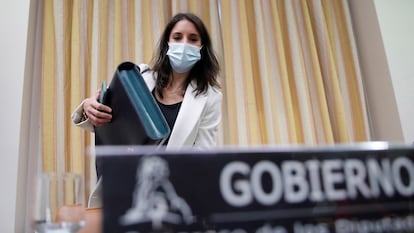Spain seeks law change to allow 16- and 17-year-olds to abort without parental consent
Equality Minister Irene Montero has announced plans to repeal the 2015 reform that requires young women to get permission from their parents before they can terminate a pregnancy

Spain’s Equality Minister Irene Montero dropped a political bombshell on Wednesday in the Congress of Deputies: a plan to repeal the 2015 reform of the abortion law. This change, which does not yet have a set date, would mean that 16- and 17-year-olds will no longer need parental consent to terminate a pregnancy.
The 2015 reform was introduced under the former government of the conservative Popular Party (PP), which had tried to eliminate abortion on demand in the first trimester and take Spain back to a case-based system. The initiative was staved off by widespread protest from women’s associations and resistance from within the ranks of the PP itself, forcing the party to scale back its proposal to the issue of parental consent. Under the reform, 16- and 17-year-olds need to have permission from their parents to have a termination. In other words, it gives parents the option of forcing their daughters to bear an unwanted child.
Montero, of the left-wing Unidas Podemos party, told Spain’s lower house of parliament on Wednesday that the repeal was “more than necessary” and that work had begun to change the law so that “all women have the right to decide over their bodies.” The change would bring Spain’s law in line with other European countries such as France, where women can terminate a pregnancy from age 16 without having to inform their family.
According to the Accredited Abortion Clinic Association (ACAI), the need for parental consent has “limited the only legal option for minors without parental care to access an abortion,” affecting between 400 and 500 women in this age group every year. At the time of the reform, the ACAI estimated that approximately one in every 10 women aged 16 and 17 who terminated a pregnancy did not have a parental guardian. No new data is available on these figures as it is impossible to know how many 16- and 17-year-olds did not seek an abortion due to the reform, explained an ACAI spokesperson, who added that it was “hardly tenable” that 16- and 17-year-olds could freely decide to be mothers, get married and to reject medical treatment, but not to voluntarily terminate a pregnancy.
Next steps
The pledge to recover the reproductive rights of all women, including minors, was part of the coalition deal signed between the Socialist Party (PSOE) and Unidas Podemos after the inconclusive results of the 2018 repeat election, and that paved the way for the formation of the current government.
But getting the changes passed will not be easy. The Equality Ministry, headed by Montero, will first have to submit the proposal to the public and negotiate the details with the Health Ministry, which is headed by Salvador Illa of the PSOE. The change will then need to be approved by an absolute majority of the Congress of Deputies: 177 votes or more in the 350-seat chamber.
The coalition government does not have an absolute majority, meaning it will need the support of other parties to pass the legislative changes. The far-right Vox, which is the third-largest group in Congress, has already indicated that it will not support the proposal.
Other measures
Montero announced other measures that would be included in the changes to the abortion law. Sex education will play an important role, which she said was a “vaccine” against gender violence. The modification will also include the right to newer forms of contraception.
The minister stated that the comprehensive care provided to victims of gender violence who are hurt by their partners or ex-partners will be extended to other victims of sexual assault and exploitation. Montero also announced plans to end the use of the so-called parental alienation syndrome (PAS) as a criterion in court decisions. This syndrome, which has no scientific basis, has been used in court to argue that children have been manipulated against their father by their mother, meaning their testimony is invalid.
Abortion law in Spain
Tu suscripción se está usando en otro dispositivo
¿Quieres añadir otro usuario a tu suscripción?
Si continúas leyendo en este dispositivo, no se podrá leer en el otro.
FlechaTu suscripción se está usando en otro dispositivo y solo puedes acceder a EL PAÍS desde un dispositivo a la vez.
Si quieres compartir tu cuenta, cambia tu suscripción a la modalidad Premium, así podrás añadir otro usuario. Cada uno accederá con su propia cuenta de email, lo que os permitirá personalizar vuestra experiencia en EL PAÍS.
¿Tienes una suscripción de empresa? Accede aquí para contratar más cuentas.
En el caso de no saber quién está usando tu cuenta, te recomendamos cambiar tu contraseña aquí.
Si decides continuar compartiendo tu cuenta, este mensaje se mostrará en tu dispositivo y en el de la otra persona que está usando tu cuenta de forma indefinida, afectando a tu experiencia de lectura. Puedes consultar aquí los términos y condiciones de la suscripción digital.









































